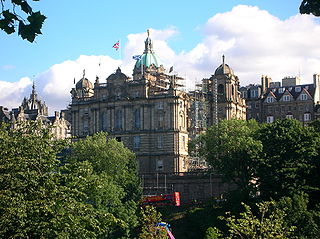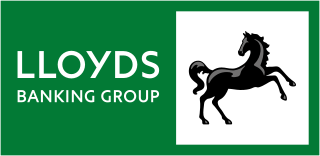Related Research Articles

The Financial Services Authority (FSA) was a quasi-judicial body accountable for the regulation of the financial services industry in the United Kingdom between 2001 and 2013. It was founded as the Securities and Investments Board (SIB) in 1985. Its board was appointed by the Treasury, although it operated independently of government. It was structured as a company limited by guarantee and was funded entirely by fees charged to the financial services industry.

The Bank of Scotland plc is a commercial and clearing bank based in Edinburgh, Scotland, and is part of the Lloyds Banking Group. The bank was established by the Parliament of Scotland in 1695 to develop Scotland's trade with other countries, and aimed to create a stable banking system in the United kingdom. The bank is the ninth oldest bank in continuous operation.

Halifax is a British banking brand operating as a trading division of Bank of Scotland, itself a wholly owned subsidiary of Lloyds Banking Group.

NatWest Group PLC is a British banking and insurance holding company, based in Edinburgh, Scotland.

Lloyds Bank plc is a major British retail and commercial bank with a significant presence across England and Wales. It has traditionally been regarded one of the "Big Four" clearing banks.
The Equitable Life Assurance Society, founded in 1762, is a life insurance company in the United Kingdom. The world's oldest mutual insurer, it pioneered age-based premiums based on mortality rate, laying "the framework for scientific insurance practice and development" and "the basis of modern life assurance upon which all life assurance schemes were subsequently based". After closing to new business in 2000, parts of the business were sold off and the remainder of the company became a subsidiary of Utmost Life and Pensions in January 2020.

Jonathan Adair Turner, Baron Turner of Ecchinswell is a British businessman and academic who was Chairman of the Financial Services Authority during the 2007–2008 financial crisis and the Great Recession, serving from September 2008 until its abolition in March 2013. He is a former chairman of the Pensions Commission and the Committee on Climate Change, as well as a former Director-General of the Confederation of British Industry. He has described himself in a BBC HARDtalk interview with Stephen Sackur as a 'technocrat'.
Frederick Anderson Goodwin FRSE FCIBS is a Scottish chartered accountant and former banker who was chief executive officer (CEO) of the Royal Bank of Scotland Group (RBS) between 2001 and 2009.

Henry Dennistoun "Dennis" Stevenson, Baron Stevenson of Coddenham is a British businessman and former chairman of HBOS. He sat on the crossbenches in the House of Lords from 1999 until his retirement in 2023.
Sir Maurice Victor Blank is an English businessman and philanthropist. He is the former chairman of Lloyds TSB and the current chairman of several educational and charitable organisations including the Social Mobility Foundation, UJS Hillel and Wellbeing of Women.
Sir Peter Alexander Burt FRSE was a Scottish businessman, former chief executive and later governor of the Bank of Scotland.

Andy Hornby is an English businessman, currently chief executive of The Restaurant Group, a British chain of restaurants and public houses.

St. James's Place plc, formerly St. James's Place Capital plc, is a British financial advice company. The head office is in Cirencester, in Gloucestershire, and there are over twenty other offices in the United Kingdom. It is a combined adviser, fund manager and life insurance business. It is listed on the London Stock Exchange and is a constituent of the FTSE 250 Index.

HBOS plc is a banking and insurance company in the United Kingdom, a wholly owned subsidiary of the Lloyds Banking Group, having been taken over in January 2009. It was the holding company for Bank of Scotland plc, which operated the Bank of Scotland and Halifax brands in the UK, as well as HBOS Australia and HBOS Insurance & Investment Group Limited, the group's insurance division.

Lloyds Banking Group plc is a British financial institution formed through the acquisition of HBOS by Lloyds TSB in 2009. It is one of the UK's largest financial services organisations, with 30 million customers and 65,000 employees. Lloyds Bank was founded in 1765 but the wider Group's heritage extends over 320 years, dating back to the founding of the Bank of Scotland by the Parliament of Scotland in 1695.
Paul Russell Moore was best known as the HBOS whistleblower following his dismissal from Halifax Bank of Scotland (HBOS) in 2004. Moore was the bank's Head of Group Regulatory Risk and was fired from the role by HBOS Group Chief Executive Office James Crosby following his warnings to the Board about HBOS's risky sales strategies.
Benny Higgins is a Scottish banker, and is the former chief executive officer (CEO) of Tesco Bank.
Degradation is the formal term for removal of a knighthood or other honour.
Martin Wheatley is a British financier, formerly managing director of the Consumer and Markets Business Unit of the Financial Services Authority in the UK, and is the former CEO of the Financial Conduct Authority.

Captain Sir Thomas Moore, more popularly known as Captain Tom, was a British Army officer and fundraiser. He made international headlines in April 2020 when he raised money for charity in the run-up to his 100th birthday during the COVID-19 pandemic. He served in India and the Burma campaign during the Second World War, and later became an instructor in armoured warfare. After the war, he worked as managing director of a concrete company and was an avid motorcycle racer.
References
- 1 2 "Sir James Crosby resigns from FSA". BBC News. BBC. 11 February 2009. Retrieved 11 February 2009.
- ↑ Financial Times 4 December 2012
- ↑ Osborne, Alistair (9 April 2013). "Ex-HBOS chief Sir James Crosby gives up knighthood and part of pension". The Daily Telegraph. London, UK. Retrieved 9 April 2013.
- 1 2 "No. 60531". The London Gazette . 11 June 2013. p. 11479.
- ↑ "Ex-HBOS chief James Crosby stripped of knighthood". BBC News. 11 June 2013.
- ↑ Michaelmas Term 1974. Complete Alphabetical List of the Resident Members of the University of Oxford. Oxford University Press. 1974. p. 25.
- ↑ "Profile of Sir James Crosby". London: Financial News. 11 February 2009. Retrieved 5 April 2013.
- ↑ "Halifax Annual Report". Hbosplc.com. Archived from the original on 15 February 2009. Retrieved 18 February 2009.
- ↑ "BUSINESS | BoS and Halifax agree merger". BBC News. 4 May 2001. Retrieved 18 February 2009.
- ↑ "Business | HBOS chief executive to step down". BBC News. 5 January 2006. Retrieved 18 February 2009.
- ↑ Jill Treanor (11 February 2009). "HBOS architect". London: guardian.co.uk. Retrieved 15 February 2009.
- ↑ Jill Treanor (29 April 2008). "Andy Hornby: HBOS chief executive". London: guardian.co.uk. Retrieved 15 February 2009.
- ↑ "Changes to the Financial Services Authority Board". HM Treasury. Archived from the original on 13 October 2008. Retrieved 12 June 2009.
- ↑ "Politics | Text: HBOS whistleblower statement". BBC News. 10 February 2009. Retrieved 18 February 2009.
- ↑ Reuben, Anthony (17 February 2009). "HBOS risk control 'dumbed down'". BBC News. Retrieved 18 February 2009.
- ↑ Robert Peston. "Lloyds and HBOS Humbled". BBC. Retrieved 18 February 2009.
- ↑ Arnott, Sarah (14 February 2009). "£10billion loss". The Independent. London. Retrieved 18 February 2009.
- ↑ Hosking, Patrick; Webster, Philip (14 February 2009). "Crosby". The Times Online. London: The Times. Archived from the original on 14 May 2011. Retrieved 18 February 2009.
- ↑ Peev, Gerri (14 February 2009). "Shares plunge". The Scotsman. Edinburgh. Retrieved 18 February 2009.
- ↑ "Chancellor appoints Sir James Crosby to lead Public Private Forum on Identity". HM Treasury. 11 July 2006. Archived from the original on 21 February 2009. Retrieved 18 February 2009.
- ↑ "Business | Easyjet founder Stelios knighted". BBC News. 16 June 2006. Retrieved 18 February 2009.
- ↑ "No. 58014". The London Gazette (1st supplement). 17 June 2006. p. 1.
- ↑ "Challenges and opportunities in identity assurance". Archived from the original on 10 September 2008.
- ↑ "Cancer Research UK : Sir James Crosby joins Cancer Research UK's Governing Council". Info.cancerresearchuk.org. 31 January 2008. Archived from the original on 15 February 2009. Retrieved 18 February 2009.
- ↑ The Financial Times 4 December 2012
- ↑ The Telegraph 11 June 2013